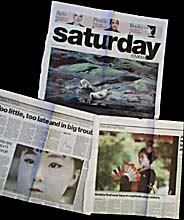|
By Jennifer Haram
It's 6:25 a.m. and the alarm buzzes.
Out of bed, grab the paper, scan the headlines
and hop into the
shower by 6:35. TV on by 6:45 to catch any late-breaking
news. In the car by 7:25. Turn on the radio to find
out the traffic situation. Traffic jams
for 35 minutes to travel 11 miles and arrive at work by 8.

People want news -- it is obvious by the number of resources
they have used by 8 o'clock in the morning. But, newspapers
may lose their traditional position of dominance
in the media industry.

With competition
from the Internet, authorities are talking about the end of
the traditional newspaper. Currently,
the 54 billion
U.S. newspaper industry consists
of about 900 papers. However, being big doesn't guarantee
survival. 
According to predictions
based on a Newspaper Advertising Bureau
study from 1961 to 1988, there will be no daily newspaper
readers in 2078. This means that if the current trends
continue, in 2078, daily newspapers will not exist. This is
the time to start making changes that will keep the newspaper
the dominant medium of the future. 
Studies show that people don't read the paper because they
say they "don't have enough time." In fact, people
have more free time today than they did 30 years ago. People
are simply choosing to spend their free time in ways other
than reading the paper. People make time for what interests
them. 
Newspapers have advantages that have been taken for granted
for years. What other source of information is literally
delivered to your door seven days a week? Where else can local
news and ads be found? Who else has a complete database
of names and addresses of residents
on every street in the entire city? This information is invaluable.
Individual houses can be targeted
for specific
advertising
messages. Much like a computer homepage,
newspapers could be customized
to fit the interests of each resident. The technology is available
and the database is there. This is the newspaper of the future.

 Of
course, this cannot happen overnight,
but steps can be taken to make this a reality. Content is
one of the most important factors of newspaper readership.
It appears that newspapers try to offer interesting stories
that will appeal
to different groups of people. Unfortunately,
that is only half the battle. Readers have to know the story
is there and how to find it. Younger generations want shorter
stories and more pictures and graphics. Of
course, this cannot happen overnight,
but steps can be taken to make this a reality. Content is
one of the most important factors of newspaper readership.
It appears that newspapers try to offer interesting stories
that will appeal
to different groups of people. Unfortunately,
that is only half the battle. Readers have to know the story
is there and how to find it. Younger generations want shorter
stories and more pictures and graphics.

Newspapers need to stress their convenience
and that they offer the quickest method for readers to find
the information they need. They also need to stress that the
information is available in a portable
package wherever
and whenever the reader wants it. A local television station
may give an event a 30-second summary.
Often readers want more details
and analysis. The newspaper fills that need; however, details
don't have to mean long stories. They can be broken into reader-friendly
packages. 
Knight Ridder Inc. Research Director Kip Cassino points out
that no man-made communications medium has ever died. We can't
let newspapers be the first to break this record. We need
to reach out to readers today and stress the value, convenience,
and content of the product
we love. After all, 2078 is getting closer every day. 
|